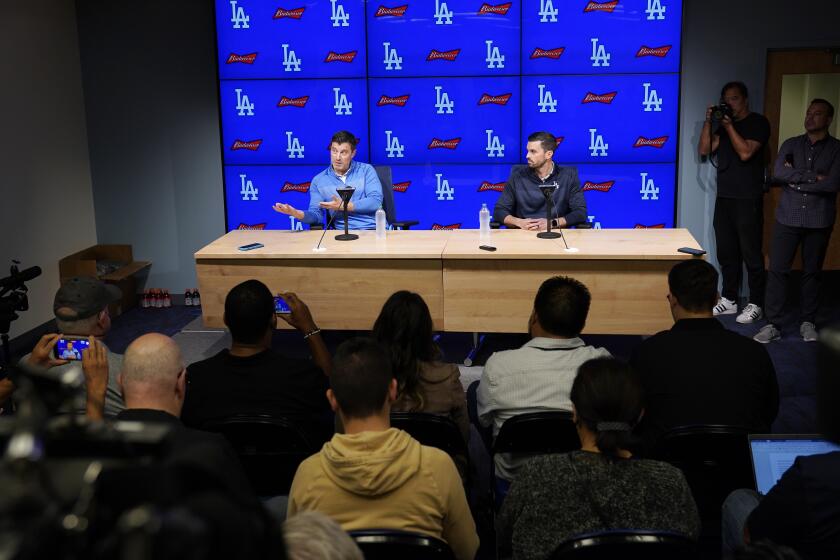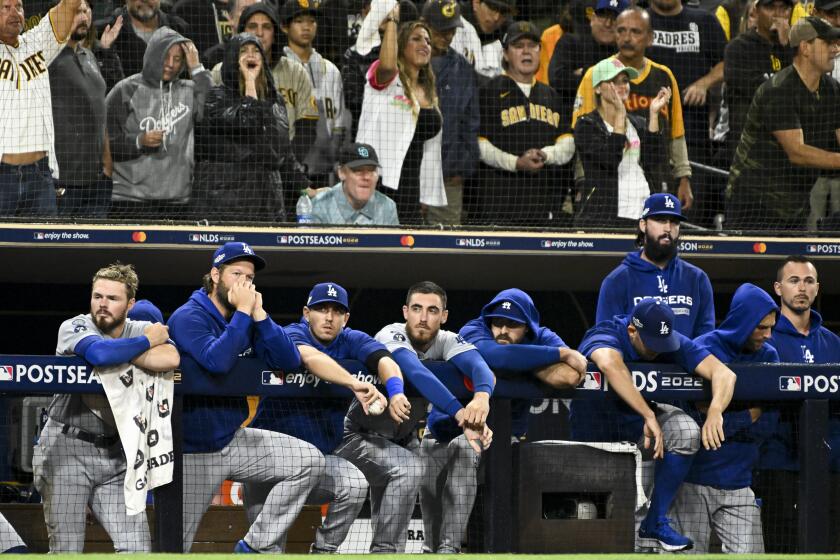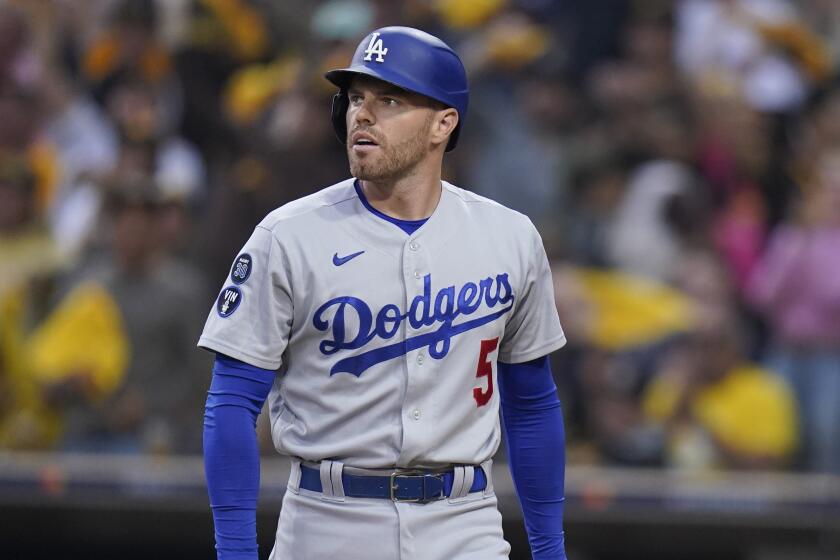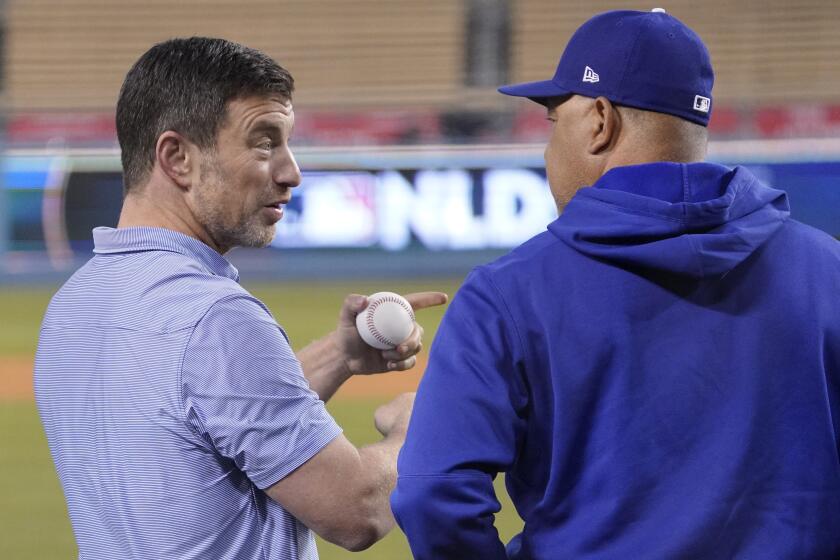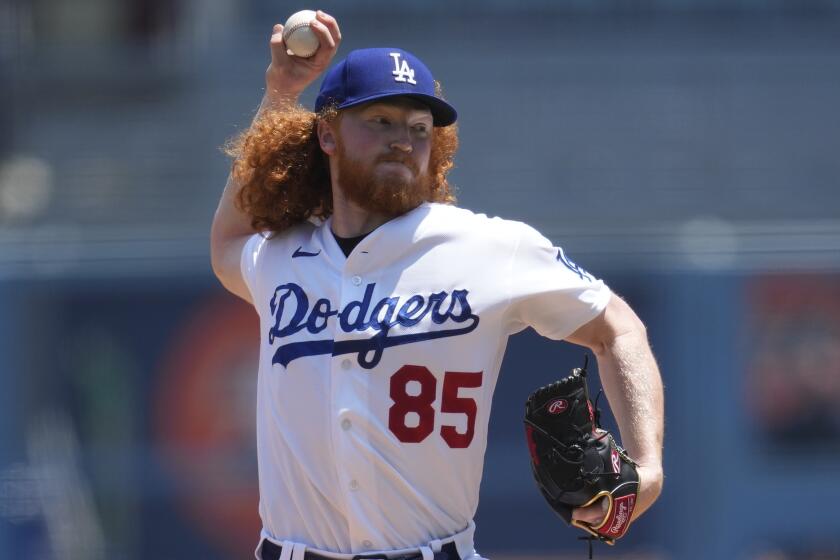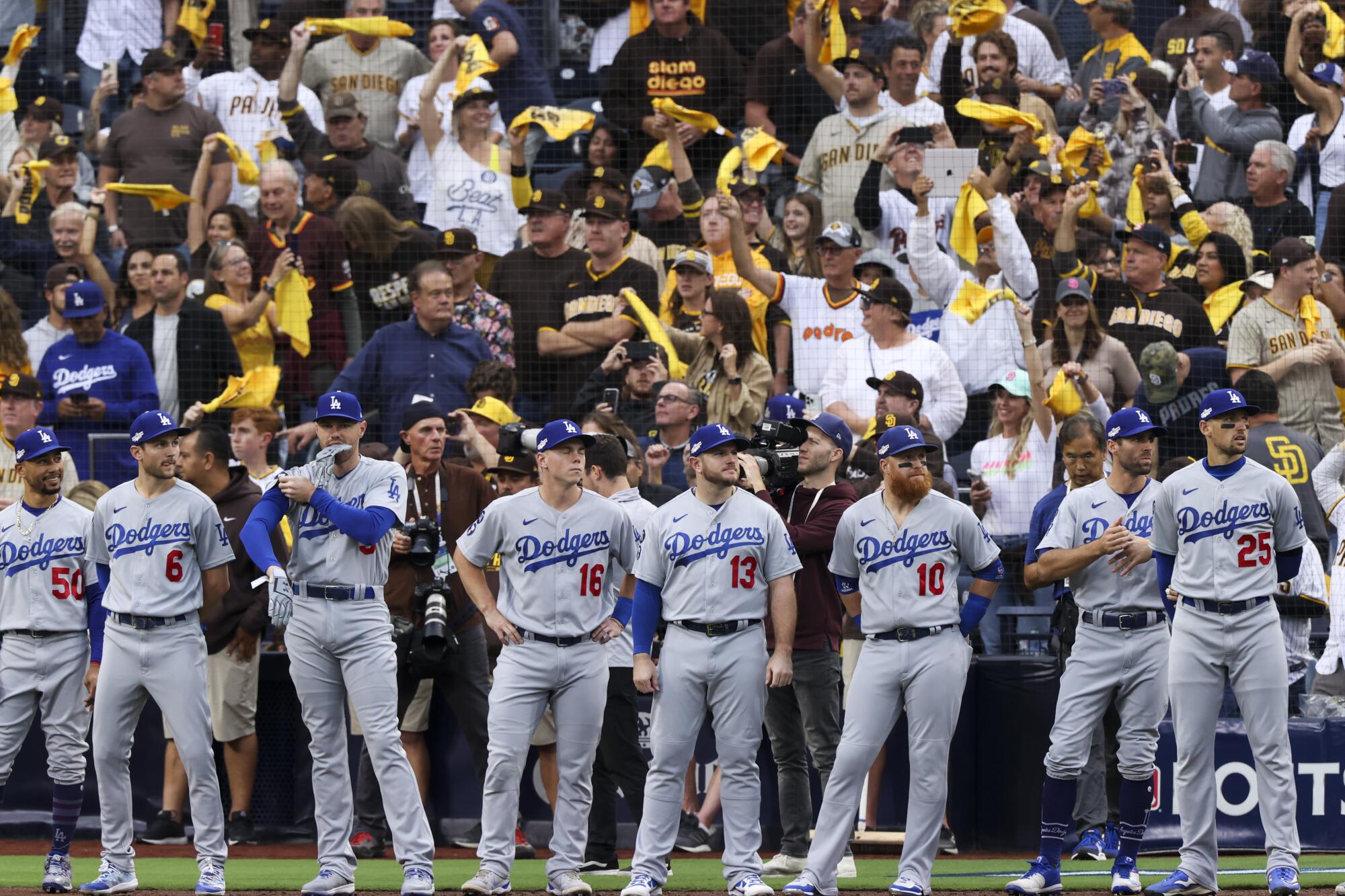
For days after the biggest disappointment in Dodgers history, fans have been furiously fanning the blame as if it were an ugly yellow towel.
Fire Dave Roberts! Fire Andrew Friedman! Sell the team! Hire an ornithologist!
The Dodgers’ historic collapse against the San Diego Padres in the National League Division Series last weekend has led to enough finger-pointing to occupy all the gloves they won’t need until February.
All but one notable group, it seems, has been accused of dereliction of Dodgers duty.
Everyone has been blamed but the Dodgers players themselves.
Honestly, this one is on them.
Roberts had a lousy seventh inning in the deciding Game 4 and still needs more dugout help. Friedman failed to acquire a starting pitcher during a summer trade deadline debacle and needs to rethink his clubhouse culture.
Andrew Friedman isn’t ready to say the Dodgers’ front office was responsible for the team’s early postseason exit. And that’s part of the problem.
But, for once, neither of the usual villains was the biggest reason for the embarrassment.
This one is on the $260 million worth of players who came up cheap.
This one is on the indifferent bats that hit .147 with runners in scoring position, nearly 130 points lower than their league-leading average in the regular season.
This one is on the languid gloves that continually failed to make the impact catch or create the game-changing play.
This one is on the businesslike collection of clubhouse veterans who didn’t show the sort of fire necessary to match the upstart Padres and their crazed fans. Where was their Kirk Gibson when they needed him? Where was their Bulldog?
This one is on Mookie Betts, whose contract is a team-high $365 million and who needs to start acting like it. He had two hits in four games, batted .143, boooo-kie
This one is on Justin Turner, also two hits, batted .154, a team leader who needed to carry more of the load.
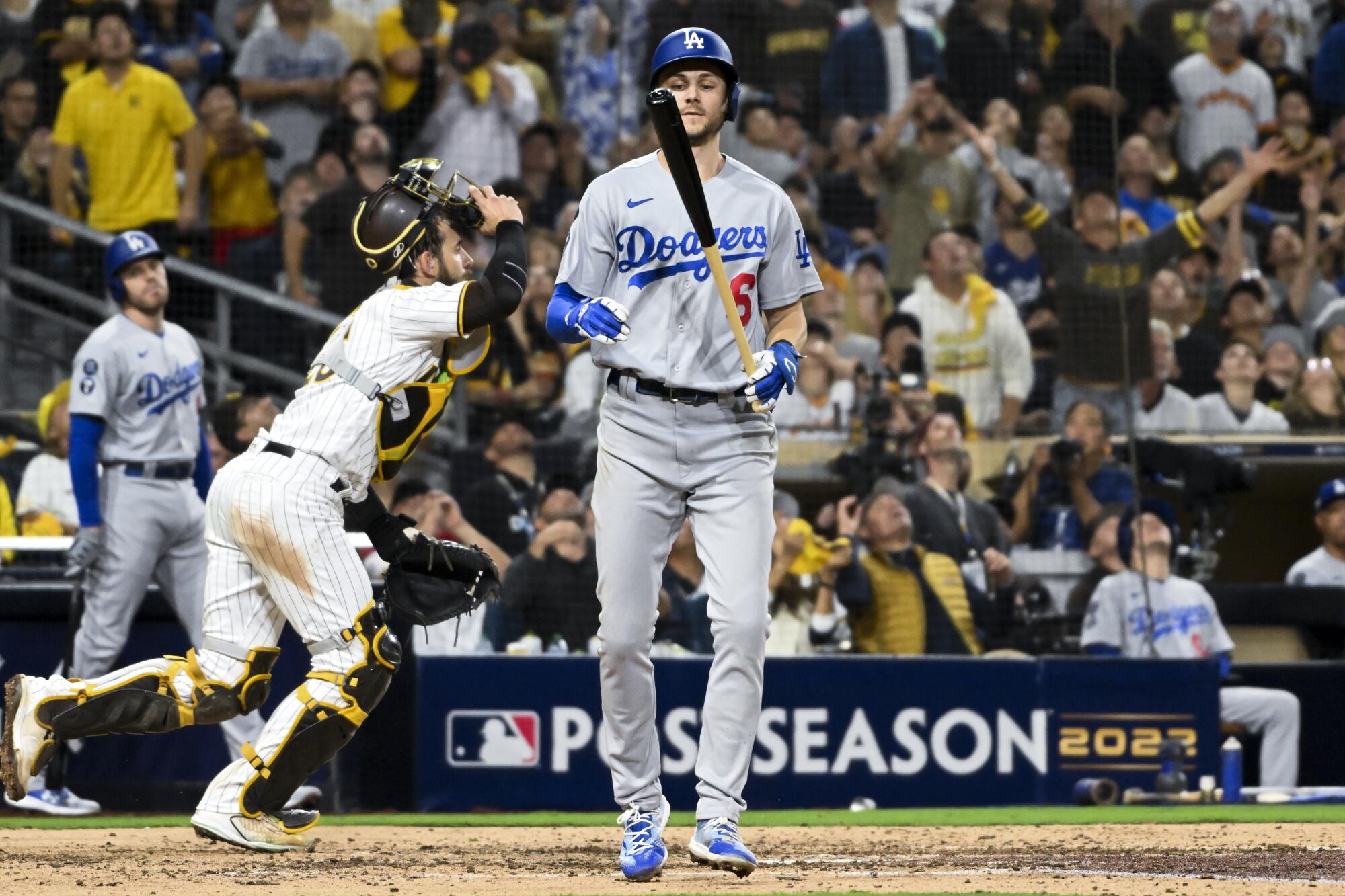
This one is on Trea Turner, potential free agent whose botched grounder in Game 2 was the beginning of the end, nice knowing you.
This one is on Will Smith, three hits, .188 batting average, a pressure player deflated.
This one is on Cody Bellinger. He had one hit in seven at-bats with four strikeouts, goodness they need to send him somewhere else, now.
“Obviously, everyone wants a clear-cut answer, and I think if you were to boil it down to its simplest form, in the regular season, we led baseball in every statistical category with runners in scoring position …. In this series, we were not good,” Friedman said Tuesday. “The question is, is it baseball? Or are there things we can do to improve upon that? Are there levers we can pull, are there things to put us in a better position there?”
Dodgers president of operations Andrew Friedman said Tuesday the team’s NLDS loss to the Padres was an “organizational failure.”
There are things to improve. There are plenty of levers to pull. But peering closely through the smoke of this particular wreckage, one can look past Roberts and Friedman and see the passionless expressions of a team that simply couldn’t summon the sense of urgency required for a five-game sprint against a desperate opponent.
In this group of stars so accomplished they finished with the fourth-highest regular-season win total in baseball history, somebody needed to put this clubhouse on their shoulders and carry it through this first treacherous step. That’s how it’s done. That’s how every championship hopeful team does it.
The Philadelphia Phillies have Bryce Harper. The Padres have Manny Machado. The Houston Astros have Yordan Alvarez.
The Dodgers had Betts talking before Game 4 about how the potential elimination game felt the same as any other game.
“We can’t start adding extra pressure, especially from within. ... It’s still the same game we’ve been playing since February,” he said.
No, it’s not. The postseason is a different season and the Dodgers needed to recognize that, and yet they calmly forged ahead as if it were June.
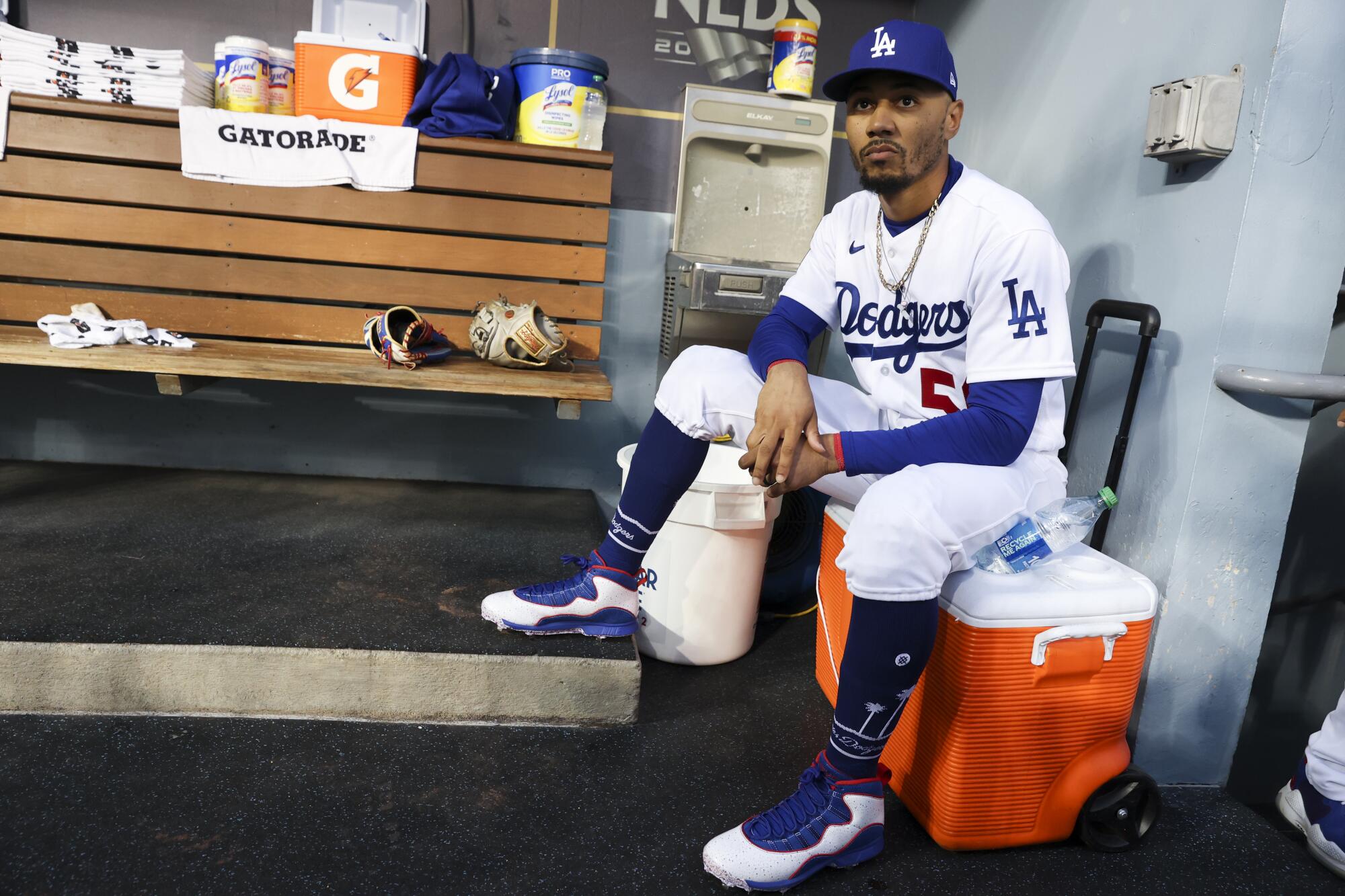
If you think about it, the only Dodgers team that has won a World Series championship during their current 10-year run of domination was the one that played in the most non-October postseason environment in history.
It was 2020, there were few fans in the stands, and every big game was played at Globe Life Field in Arlington, Texas.
“So many of our guys have a lot of postseason experience, it’s not being intimidated by the moment,” protested Friedman.
Yet, unlike the swaggering Dodgers champions of past seasons — remember, Fred Claire signed Kirk Gibson simply because he would cause a ruckus — these Dodgers have been built not for that moment, but for the long haul.
Friedman is looking for a lever? How about an offseason acquisition that will produce a clubhouse leader with some fresh fire? It has to be an everyday player. He has to be Patrick Beverley in a ballcap.
Betts is not built to do it. Freddie Freeman is too pleasant to do it. Will Smith is too quiet to do it.
Barely a week after setting a franchise record with 111 regular-season victories, the Dodgers see their season end in an NLDS loss to the Padres.
And it’s not the manager’s job to do it. Roberts has other stuff on his plate.
Like, figuring out how to successfully navigate pressure October innings.
No, Roberts is not getting fired, Friedman confirmed that Tuesday, and it was no surprise.
Roberts has a higher winning percentage than any six-year manager in baseball history, a stint that has included six playoffs, three World Series appearances and one short-season World Series championship. Besides, are you legally allowed to fire any baseball manager after 111 wins?
Still, the local criticism of this manager reached a critical mass this week after a chaotic elimination game that was once again plastered with Roberts’ fingerprints.
A starting pitcher pulled too soon. A star reliever used too late. A miscommunication that became a game-winning hit. Dodgers fans have seen this before. A crucial loss in at least three other losing postseason series have been painted with the same brush.
MLB expanded the playoffs from 10 to 12 teams for this season and the Dodgers earned a first-round bye. It had nothing to do with their elimination.
It was a mess again, and Roberts knows the chatter is out there again, but he said he has an answer for it.
“Honestly, I really have not paid attention to it,” Roberts said in a phone interview Tuesday. “What I do know, there was a lot of work and preparation and thought that went into giving the players the best chance for success.”
Friedman backed him up, saying, “I personally don’t think the criticism that Dave has received has been fair.”
Much of the heat on both men has stemmed from the perception that Roberts is forced to follow a script written by Friedman, a notion that Friedman has vehemently denied.
Friedman was irritated when asked if Roberts is allowed to make his own in-game decisions.
“One-hundred percent,” he said. “And we’ve answered this a lot of times.”
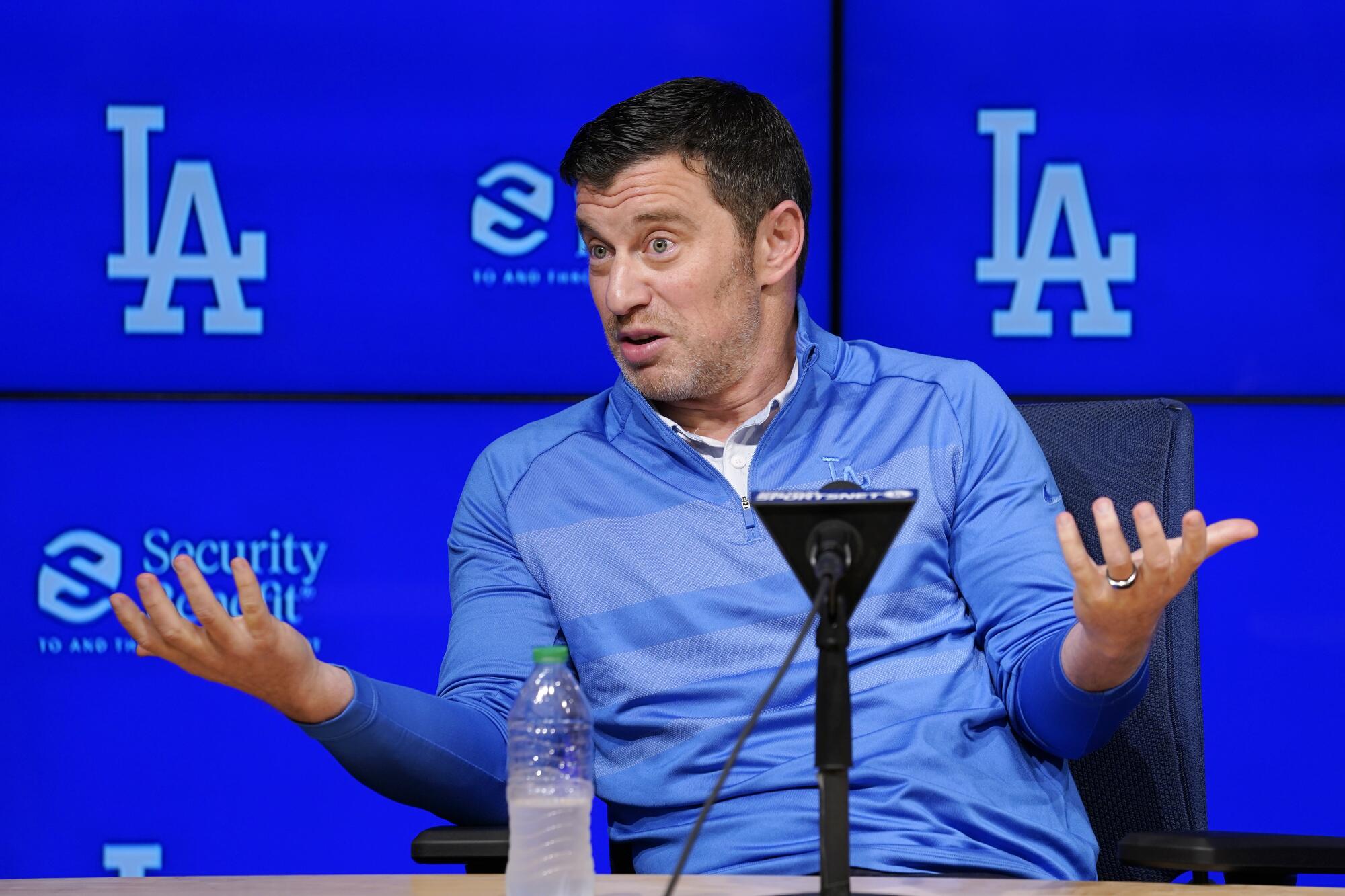
When told of Friedman’s statement, Roberts confirmed it.
“Everything that we do, there’s information, and I welcome all of it. ... There’s so many scenarios I need to be prepared for,” he said. “But, ultimately, do I make the decisions? Absolutely.”
This being the case, while Friedman is looking for a game-changer in the clubhouse, he needs also to give Roberts more help in the dugout. The game speeds up. Roberts can get lost in the numbers. He needs to be reminded to manage with his eyes.
One decision Roberts said he doesn’t second-guess was last spring’s public guarantee that this team would win a World Series championship.
“I don’t regret it. ... I think it showed how much belief I have in the players and organization,” he said. “I don’t think my quote in spring training had any bearing on four games in October. Words are powerful, but mine are not that powerful.”
Dodgers manager Dave Roberts doesn’t deserve all the blame for the Dodgers’ season ending in grim fashion. Andrew Friedman also needs to be scrutinized.
Yet, will he be offering the same promise next spring? What do you think?
“I won’t be guaranteeing it next year, but my belief in this organization is just as strong,” he said.
Exasperated Dodgers fans will need to see some changes before sharing that belief.
While Roberts and Friedman have much work to do, this time those changes need to start with the Dodgers players themselves.
More to Read
Are you a true-blue fan?
Get our Dodgers Dugout newsletter for insights, news and much more.
You may occasionally receive promotional content from the Los Angeles Times.


